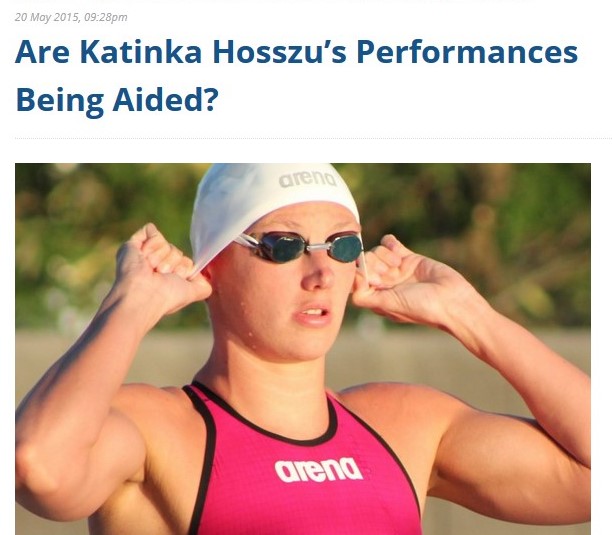Katinka Hosszú represented Hungary in Rio and she had a fabulous Olympics. She won three gold medals and one silver, a truly astounding sport achievement!
Last May an editorial appeared in the Arizona-based magazine Swimming World that questioned whether Hosszú uses performance enhancing drugs. The commentary by Casey Barrett was entitled: Are Katinka Hosszú’s performances being aided? Barrett indicated that there was no proof that Hosszú used performance enhancers and the editorial was based on his personal opinions and observations. (Read Casey Barrett’s editorial here.)
On November 12, 2015 Hosszú filed a lawsuit against Barrett as a response to “libelous and defamatory statements of the most damaging variety that can possibly be made about a professional athlete.” She demanded 5 million dollars (1.5 billion Ft), punitive damages and legal expenses.
The lawsuit stated: “In her native Hungary, Hosszú is widely regarded as a hero and role model. Swimming is among Hungary’s most successful Olympic sports, and Budapest will be hosting the 2017 FINA World Championship. Hosszú is held in high regard by the Hungarian Swimming Association, and Hosszú’s accomplishments are publicly regarded by members of Hungary’s government as a source of national pride.”
On August 12, 2016 US District Judge Honorable G. Murray Snow dismissed Hosszú’s lawsuit. All claims are dismissed with prejudice; Barrett’s editorial is protected by the First Amendment. (Read here the Judge’s order.)
Hosszú has never failed a doping test yet the US media has scrutinized her. The New York Times analyzed her relationship with her husband and coach Shane Tusup; Kevin Draper in deadspin.com wrote that Katinka’s strength gains, her improved performance, and her relationship with Shane reminded him disgraced star athlete Marion Jones and her ex-husband C.J. Hunter. (Read here.)
Slate Magazine on the other hand accused some in the US media of bias. They published a piece entitled: A foreign swimmer set a world record. Let the irresponsible doping accusations begin. “It’s wrong to make nod-nod, wink-wink suggestions that specific athlete are doping without any hard evidence to back up those accusations. Record-setting athletes are by definition outliers. When those record-setting athletes come from the United States, their remarkable achievements are celebrated as evidence of determination and natural talent. Nobody is suggesting that 35-year-old American freestyler Anthony Ervin—who swims faster now than he did as an Olympic gold medalist 16 years ago—is a big cheater, nor should they. But when record-setters emerge from foreign waters, much of the American media takes a guilty-until-proven-innocent approach. And when it comes to accusations of doping, you can never be proved innocent.” (The Slate article.)
Well said June Thomas! In Hosszú’s case some media outlets irresponsibly took a guilty-until-proven-innocent approach indeed. Although Barrett’s article is protected by the First Amendment it would have been better not to publish it. As the proverb says – Talking is silver, silence is golden.
György Lázár




